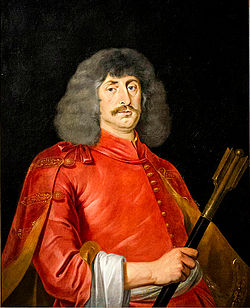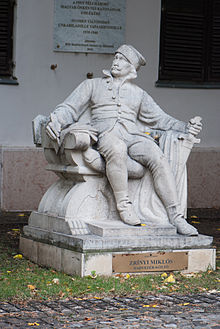Nikolaus Zrinski
Nikolaus VII. Šubić von Zrin , in short Nikolaus VII. Zrinski ( Croatian Nikola VII. Zrinski , Hungarian Zrínyi VII. Miklós ; * May 1, 1620 in Čakovec , Kingdom of Croatia ; † November 18, 1664 in Kuršanec near Čakovec) was ban from Croatia , imperial general and Croatian-Hungarian poet .
Life
Origin and education
He was the son of Georg Zrinski and Magdalena Széchy . His great-grandfather was Nikola Šubić Zrinski .
Zrinski was educated at Jesuit schools in Graz and Vienna . In 1638 he began an officer career .
Thirty Years' War
During the Thirty Years' War he fought against the Swedes in Moravia in 1645 and against the Turks in 1646. In the same year he was appointed General and in 1647 Ban of Croatia .
Turkish Wars
From 1652 to 1653 he was involved in constant battles with the Ottoman Empire .
1655 presented Zrinski himself at the head of the national party, against the absolutist aspirations of Emperor Leopold I occurred. In addition, he demanded a Hungarian army of his own, as the imperial troops were unable to drive the Turks out of the country. This brought him into opposition to the court party . When it was also revealed that he had negotiated with France, his election to the Palatine was thwarted. To defend against the Ottomans, he built the Neu-Zrin fortress (Croatian Novi Zrin ) in 1661/62 in the far east of the Međimurje rule , which was destroyed after their siege in 1664.
During the Turkish War of 1663/1664 he was able to conquer the bridge of Osijek (Hungarian: Eszék ), which was heavily fortified by the Turks , and thus prevent the further advance of the Turks to the west for the time being, but was not sufficiently supported by the imperial troops under Raimondo Montecuccoli . During the Turkish offensive that followed, Zrinski had to go back to the Styrian border . He was a bitter opponent of the Peace of Eisenburg , which in 1664 assured the Turks of their conquests.
death
In the same year he died of injuries inflicted by a boar while hunting. Rumors that he was murdered at the behest of the court persisted.
Works
He was a friend of the sciences and a poet who spoke German , Croatian , Hungarian , Turkish and Latin well.
In 1645/46 he created the Hungarian-language epic in 15 songs Obsidio Szigetiana (Hungarian: Szigeti Veszedelem , German: The Fall of Sziget ), which glorifies the heroic deed of his great-grandfather Nikola Šubić Zrinski , who died in the siege of Szigetvár in 1566 .
From an important library ( Bibliotheca Zriniana ) that he had collected , 529 volumes and 29 manuscripts are still in the National and University Library ( Nacionalna i sveučilišna knjižnica ) in Zagreb .
Marriages and offspring
On February 11, 1646 he married the Countess Eusebia Drašković von Trakošćan , but she died on September 24, 1650. On April 30, 1652 he remarried, namely Maria Sofia Löbl from Vienna. She bore him four children, one of whom was Adam .
literature
- Manfred Stoy: Zrinski, Nikola Graf . In: Biographical Lexicon on the History of Southeast Europe . Volume 4. Munich 1981, p. 504 f.
- Zrinyi, Miklós, Count . [younger] . In: Encyclopædia Britannica . 11th edition. tape 28 : Vetch - Zymotic Diseases . London 1911, p. 1045 (English, full text [ Wikisource ]).
- Wilhelm Kühlmann, Gábor Tüskés (ed.): Milita et Litterae. The two Nikolaus Zrinyi and Europa , Tübingen 2009.
Web links
- Literature by and about Nikolaus Zrinski in the catalog of the German National Library
- Short biography with picture ( Memento from September 27, 2007 in the Internet Archive )
- Illustration by Mathias van Somer from 1665:… Nicolaus Comes… á Zrino… ( digitized version )
Individual evidence
- ↑ Zrínyi Miklós (1620–1664) ( Memento from June 27, 2011 in the Internet Archive ; PDF)
| personal data | |
|---|---|
| SURNAME | Zrinski, Nicholas |
| ALTERNATIVE NAMES | Zrinski, Nikolaus Graf; Zrinyi, Nikolaus (German); Zrinski, Nikola (Croatian); Zrínyi, Miklós (Hungarian) |
| BRIEF DESCRIPTION | Croatian-Hungarian general and poet |
| DATE OF BIRTH | May 1, 1620 |
| PLACE OF BIRTH | Ozalj Castle near Karlovac, Croatia |
| DATE OF DEATH | November 18, 1664 |
| Place of death | Čakovec , Croatia |





